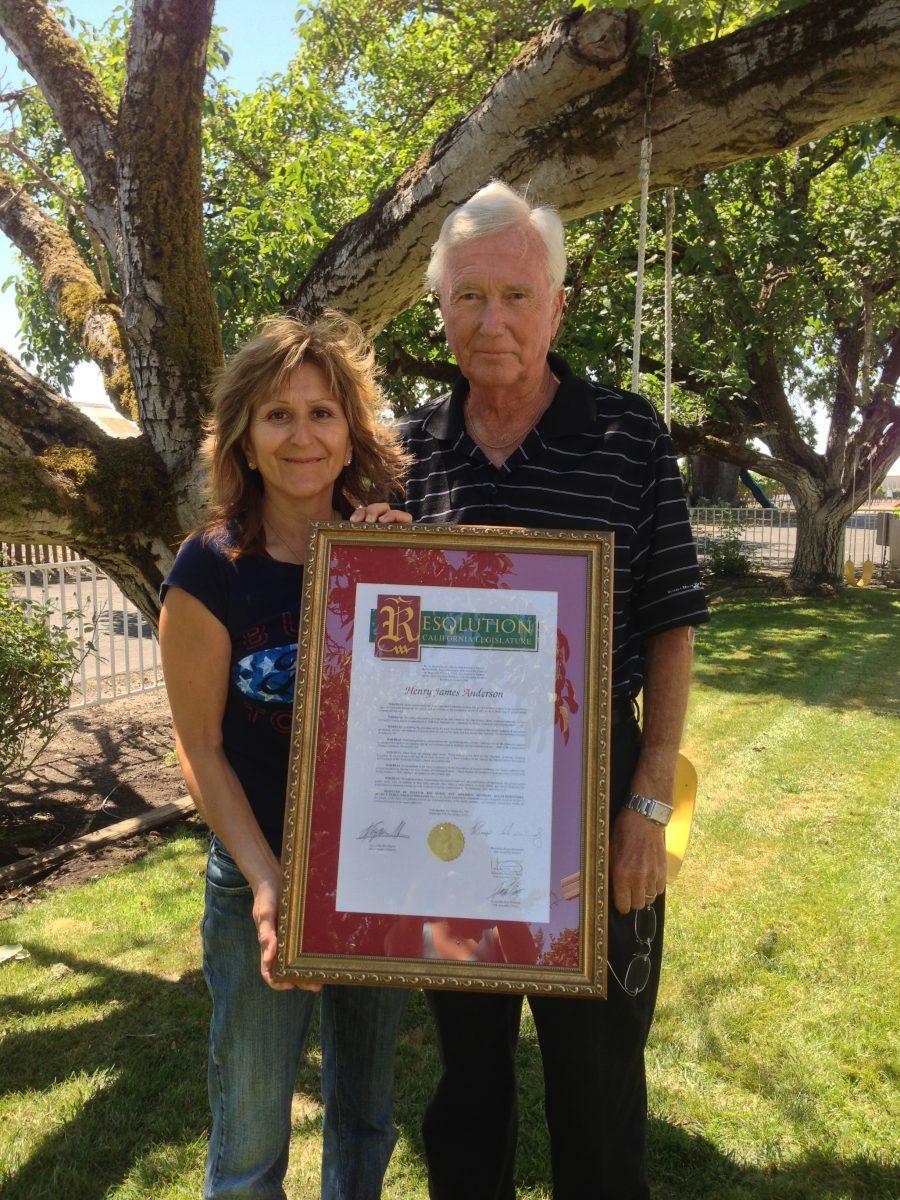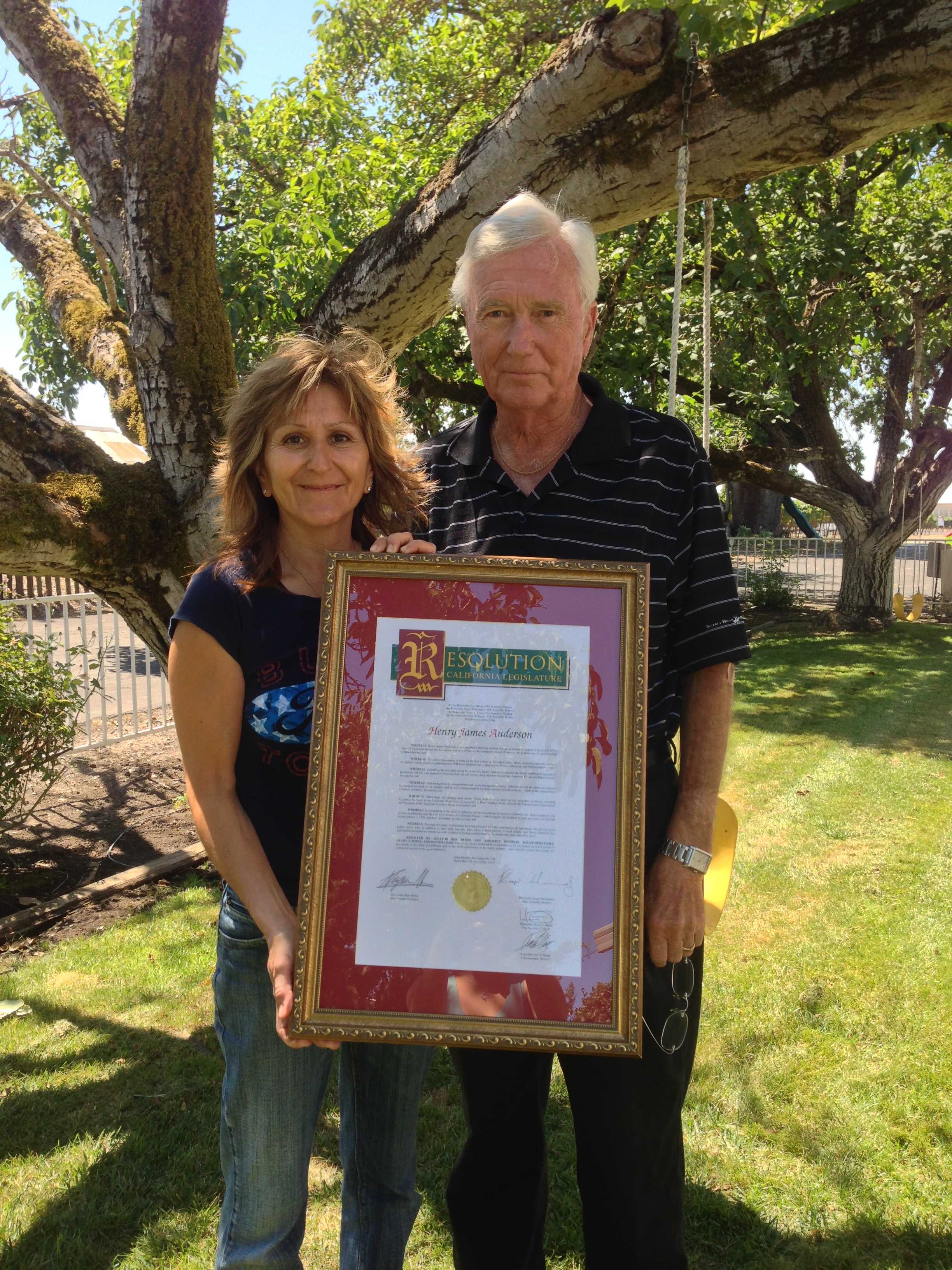Over 165 years ago, six families made the dangerous trek across the Sierra Mountains in covered wagons arriving only three weeks before the ill-fated Donner Party. Now, almost 200 years later, one of their direct descendants is still living on and farming the land that his ancestors bought so many years ago.
Henry James (Jim) Anderson lives with his wife Grace and their two children, one of whom is a senior economics major at SSU, on the family property off Petaluma Hill Road. Because of the family’s continuous devotion to Sonoma County, the California State Assembly voted to grant the Anderson family a resolution and a flag that flew over the Sacramento on July 3. California State Senator Ben Hueso presented the resolution to the family on June 26.
This resolution recognizes the Anderson family as descendants of some of California’s founding pioneers, for their ongoing agricultural dedication, as well as Anderson’s contributions to both the state of California as well as to Sonoma County.
Not only has the Anderson family been instrumental in the development of the county, but also of Sonoma State University. Before Rohnert Park became home to SSU, the Cooney family, who also crossed the prairie with Anderson’s family, owned the land upon which it is now built. Eventually the family fell on hard economic times and finally sold the land to the state of California. The deed for this transaction was signed in Anderson’s home and was witnessed by his father in 1959. The family still owns a copy of this deed, as well as the desk upon which it was signed.
The university was not originally planned to be built in Rohnert Park since land in other places would have been roughly $300 cheaper.
“My father thought $300 was peanuts compared to how much culture the university would bring to the county,” said Anderson. “And this university is better than fantastic.”
Anderson’s father was a friend and advisor to SSU’s first president, Ambrose Nichols, for five years. True to their love of the university, the Anderson family has continuously lent their support to the school.
“I love being able to look out our bedroom window and see the Green Music Center all lit up and hear the music. It’s beautiful,” said Grace Anderson.
The family has also allowed the SSU geology department to conduct digs on their property, one of which yielded a Native American pestle and mortar.
“The Pomo and Miwok Indians used to live right across the creek from my family and were very friendly and helpful,” said Anderson.
It is this kind of cooperation and mutual respect that the Anderson family seeks to rely on in their interactions with the community at large.
“The university is fantastic and we love what it’s brought to the community. Thousands of people drive by on Petaluma Hill Road every day and we just want people to know that we’re here,” said Grace Anderson.
Following the resolution, the family has made plans to catalog their extensive knowledge and their vast collection of historical artifacts for the posterity of Sonoma County.
“We have trunks and furniture that were brought over the mountains in the wagon trains,” said Anderson. Also among the family’s collection are family bibles, clothing, farming tools and daily logs. A number of the trees on the property outdate the family’s residence, and there are original buildings and fences as well.
However, farming and animal husbandry aren’t the only things the family has done.
In 1968 Kirk Kerkorian, former owner of MGM, hired Anderson to pioneer the livestock transportation industry. Anderson was one of 12 people to begin the practice of transporting livestock around the world via airplane using convertible planes.
“I once flew around the world five times in six weeks and didn’t come home once,” said Anderson.
It is this kind of innovative and entrepreneurial spirit that has kept the ranch alive. As big corporations like Monsanto become increasingly popular it is also becoming harder for independently owned and operated ranches, like the Andersons’, to continue to profit.
“Things get hard and you’ve got to get enough money to make things work,” said Anderson. Thus, the ranch is constantly evolving in order to achieve a balance between tradition and progress.
It is the family’s hope that as they continue to change with the times that their contributions to the surrounding area will not be forgotten and that their presence will continue to be remembered.





![[Both photos courtesy of sonoma.edu]
Ming-Ting Mike Lee stepped in as the new SSU president following Sakakis resignation in July 2022](https://sonomastatestar.com/wp-content/uploads/2024/04/CC4520AB-22A7-41B2-9F6F-2A2D5F76A28C-1200x1200.jpeg)



























